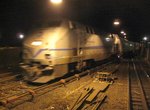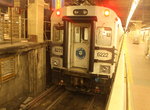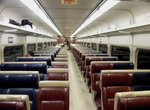Metro-North Grand Central/Park Avenue Tunnel
![]()
Grand Central Terminal exterior with Pan Am/Met Life building behind. Photo by Steffen Petrasch, October 2006.
Overview
Grand Central Terminal is a vast complex, including office buildings, several subway lines (4,5,6,7,S) as well as two levels of railroad tracks. (More on the subway lines can be found in our various subway line guides: IRT East Side Line, IRT Flushing Line, IRT Times Square-Grand Central Shuttle.)
The railroad portion of Grand Central Terminal is accessed through the main concourse, probably one of the most easily-recognized interiors in the world. The building has recently been renovated in accordance with its original design. This included the addition of a second Grand Staircase which was in the original design but not built during the original construction of the Terminal. The extensive cleaning is most noticeable on the ceiling of the Main Concourse, where the Sky Ceiling painting depicting constellations of the Zodiac had deteriorated to the point where it was barely visible. A small uncleaned patch was left, high in one corner, to remind one and all of how bad things had actually been before the cleaning and reconstruction work.
The Upper Level features 29 platform tracks, sharing island platforms as follows (from west to east): 41/42, 39/40, 38, 37/36, 35/34, 33/32, 30/29, 28/27, 26/25, 24/23, 21/20, 19/18, 17/16, 15/14 and 13/11. The Lower Level platform tracks are numbered in the 100s and are arranged in platforms as follows from west to east: 115, 114/113, 112/111, 110/109, 108/107, 106/105, 104/103, 103/102, and 102/101. Both the Upper and Lower Levels include several yard areas for servicing, maintenance, and storage of equipment. The Terminal was designed so that long-distance trains to Albany, Boston, Chicago and other points would operate primarily from the Upper Level, and local commuter trains from the Lower Level. Amtrak moved their operations to Penn Station in 1991, so now only Metro-North trains see regular service to the Terminal.
Departing from the Terminal, the tracks combine to form a four-track trunk line through the Park Avenue Tunnel, with tracks numbered from west to east 4, 2, 1, and 3. Along the tunnel are three former stations. The stations are located at 59th Street, 72nd Street, 86th Street. Each has two side platforms alongside four tracks. These platforms are now used for storage and emergency exits. (More info about the abandoned stations.)
The tunnel portal is at 97th Street and we rise to a full viaduct by 99th Street, the structure being full concrete tie and ballast construction. An abandoned station is found at 110th Street, which had four tracks and two side platforms.
We arrive at 125th Street, recently restored to original appearance. Tracks four and two share the west island; tracks 1 and 3 share the east island. Tracks one and two are on the "express" side of the platforms. This is the last transfer point for all three lines. For continuation, see: Metro-North Hudson Line, Metro-North Harlem Line, Metro-North New Haven Line.
Photo Gallery
| Five Random Images | ||||
 Image 91034 (222k, 1044x788) Photo by: Paul Pesante Location: Grand Central Terminal |  Image 122085 (404k, 1044x698) Photo by: Richard Chase Location: Grand Central Terminal |  Image 130324 (311k, 1044x703) Photo by: Daniel Negron Location: Grand Central Terminal |  Image 131846 (247k, 1044x703) Photo by: Lee Winson Location: Grand Central Terminal |  Image 135365 (243k, 1044x703) Photo by: Lee Winson Location: Grand Central Terminal |
Photos By Location
Photo locations: Grand Central Terminal, 59th Street (Park Ave Tunnel - Abandoned), 97th St/Park Avenue, MNRR Nick Tower, MNRR 125th Street, MNRR 125th St., Harlem River Bridge
Page Credits
By Peggy Darlington.